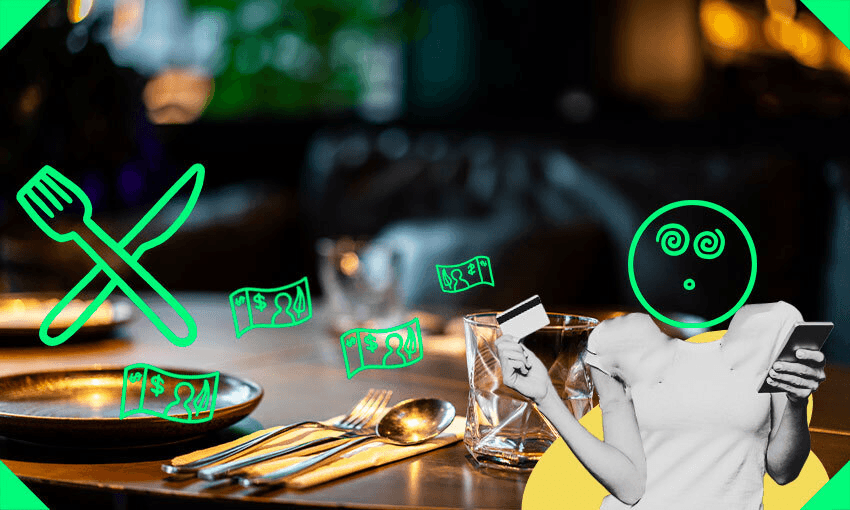As the hospitality sector builds back after lockdown, many diners are noticing a change when they make a reservation. What are booking fees and credit holds, and why are they showing up more than ever? Naomii Seah investigates.
“It’s something that people have found very different,” says Leola King of Candela. “I call it the new Covid reservations,” she laughs.
Many restaurants, including Candela, a Spanish-influenced wine bar on Auckland’s Karangahape Rd, are now using online booking systems that have a credit hold function. Most of these systems specify a 24-hour cancellation policy. This means that when the booking is placed, customers enter their credit card details, and may incur a charge if a cancellation occurs with less than 24 hours’ notice, or if they fail to turn up.
No-shows or late cancellations have long been damaging to the hospitality industry, even before Covid. But in the pandemic context, no-shows are hitting restaurants harder than usual. In the wake of 18 months of reduced trading, many businesses are finding innovative ways to protect their sector. That includes the recent proliferation of credit holds and booking fee systems.
“There’s definitely been more conversations around taking booking fees,” says Marisa Bidois, CEO of Restaurant Association NZ. In the context of Covid, she explains, “it’s even more important that there’s assurance people will be there”.
Cocoro, a Japanese fine-dining restaurant in Auckland’s Ponsonby, recently posted an Instagram story about a booking no-show soon after reopening. “It is because of dickheads like you restaurants have to take credit cards for the simplest booking,” said the post. “Inconsiderate people like you rip all the joy away from hospitality.”
Co-owner Ricky Lee explains that a no-show of even two people in his small restaurant equates to around an 8% loss of operations on any given night.
Cocoro currently uses a booking fee system for large groups and its tasting menu, as they need to order supplies and prepare for these bookings in advance. With no-shows, it can feel as if “we’re doing things for nothing”, says Lee.
King says that Candela introduced its booking fee system in July for large groups of eight or more, with charges of $50 per person in the event of a late cancellation or no-show. That’s because kitchen and bar staff often order more to cater for their bookings, or extra front-of-house staff are rostered on in preparation for large groups.
“With lockdown, I decided to implement that across the board just to protect ourselves, says King.
Because the public are aware of the pandemic’s impacts on hospitality, notes Bidois, the feedback they’ve received from the public has been generally positive.
“Framed clearly, people know what they’re signing up for,” says Bidois. “The public have been so supportive of the hospitality industry during the toughest times. There’s a lot of empathy.”
But what if late cancellations are unavoidable, say due to a diner developing Covid-like symptoms?
An Auckland diner recently spoken to by The Spinoff was charged $100 for cancelling a dinner booking at a Ponsonby restaurant due to having symptoms, despite being clear about the reason for cancelling and also rescheduling the booking. She notes that in their defence, it had been an automatic charge as she’d booked online, but a follow-up email and call still resulted in the charge.
The diner says that she is “totally supportive” of restaurants charging booking fees, but was “moderately irritated” by the experience as “charging the same for a no-show as a cancellation seems excessive. It would also arguably encourage no-shows.”
“It’s a tough one,” agree King and Lee, who both emphasise that the right thing to do in this scenario is not to charge.
However, both also recognise that some people may use Covid as, in Lee’s words, a “get-out-of-jail-free card”.
“How do we decide if they’re truly symptomatic or not?” asks Lee. “It’s going to be very difficult… it will have to be case by case.”
Lee says he is considering a voucher system, or something similar, in the event a booking fee is charged due to a Covid-related cancellation.
For her part, King stresses that any time there’s a cancellation at Candela, “it’s not a charge straight away scenario”. She emails the customers, and tries to open lines of communication to ensure they remain “very flexible and reasonable” around Covid.
As for the 24-hour policy, Bidois, Lee and King all emphasised the importance of “reasonable notice”, to ensure the establishment can fill that table.
For Lee, even a call at 4pm on the day can make a huge difference. King was slightly more conservative, but noted that even 12 hours’ notice could help.
“Think about it like going to your friend’s place,” says Lee. “If you can’t make it, you’d tell your friends. Why are we any different?”
And this increased understanding between restaurants and customers is what Candela and other establishments are hoping to achieve with their new booking systems.
“Introducing this booking system is actually having a really positive impact,” says King, who notes they haven’t had to charge many people for cancellations or no-shows since they implemented it. In her observation, the impact of the booking fee system is largely an increased understanding and empathy from the public.
“Just by filling in their credit card details, or reading the statement,” continues King, “people are becoming more aware of the effect that cancelling late and not showing up has on restaurants.
“I feel proud of hospitality for implementing protections like pre-authorisations,” says King. “If people can get used to it, and be more aware, it’s going to help [hospo] overall.”



